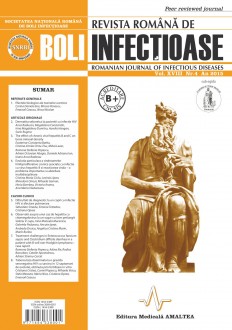SELECT ISSUE

Indexed

| |

|
|
|
| |
|
|
|

|
|
|
|
|
|
| |
|
|
HIGHLIGHTS
National Awards “Science and Research”
NEW! RJID has announced the annually National Award for "Science and Research" for the best scientific articles published throughout the year in the official journal.
Read the Recommendations for the Conduct, Reporting, Editing, and Publication of Scholarly work in Medical Journals.
The published medical research literature is a global public good. Medical journal editors have a social responsibility to promote global health by publishing, whenever possible, research that furthers health worldwide.
TREATMENT CHALLENGES IN ENTEROCOCCUS FAECIUM SEPSIS AND CLOSTRIDIUM DIFFICILE DIARRHEA IN A PATIENT WITH B-CELL NON-HODGKIN LYMPHOMA – CASE REPORT
Ramona Stefania Popescu, Adina Ilie, Rodica Bacruban, Catalin Apostolescu and Adrian Streinu-Cercel
ABSTRACT
The risk of developing secondary infections in immunocompromised patients due to hematological malignancies and the treatments for such conditions is very well known. Fever can be the only manifestation of a serious infection among this category of patients. The degree and duration of neutropenia is directly related to the risk of multiple infectious complications. When we are dealing with severely impaired host defenses virtually any microorganism can become invasive, bacteria (gram-positive pathogens, but gram-negative as well), being the greatest immediate threat. Multiple pathogens isolated from an immunocompromised host can represent a major challenge for the clinician, especially when we have to face multidrug resistant (MDR) microorganisms, also called “superbugs”. Besides, when we confront such a patient with many comorbidities and a high risk for MDR pathogens infection, we also confront with a lot of limitations in terms of treatment options. We present a complicated case of glycopeptide-resistant Enterococcus faecium sepsis secondary to Clostridium difficile colitis in a 63 years old female patient with B-cell non-Hodgkin Lymphoma (NHL) during the R-CHOP therapy.
Keywords: sepsis, Enterococcus faecium, Clostridium difficile, fecal microbiota transplantation
